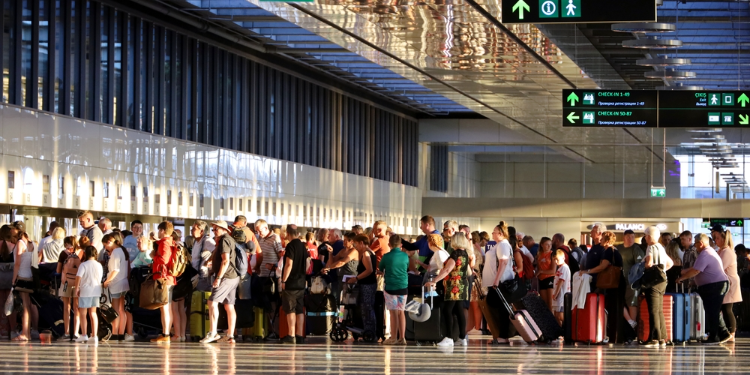
Immigration has triggered vibrant debates in European parliaments lately, mainly in Hungary, France, Germany, the UK, Portugal, Slovenia, Sweden, and Denmark. Indeed, many European countries are redefining their immigration strategies for better balance. The war in Ukraine and the economic crisis resulting from the pandemic years are calling for action. But how should countries react to the urgency of labor shortages in particular? This is the crux of the debate between pro- and anti-immigration groups in Europe.
European countries' stand on immigration
Supporters of a single European immigration policy will have to wait long. Every economic crisis is accompanied by a debate on immigration and its paradoxes. Despite an unfavorable international context (war in Ukraine, energy crisis, inflation, consequences of the health crisis, etc.) Europe is short of manpower. In September 2022, some 6 million jobs were vacant. The unemployment rate dropped to 6%, the lowest ever recorded by Eurostat, the institute responsible for data collection. 94% of French companies and 87% of German companies said they were finding it difficult to recruit.
Poland, Romania, Bulgaria and Albania are having to cope with the brain drain to other, more attractive European countries, exacerbating the labor shortage. This is particularly true in industry. In 2022, a European Training Foundation (ETF) study showed that around 40% of Albanian citizens with higher education had emigrated.
Over and above the economic urgency of alleviating the labor shortage, the debates currently shaking the old continent, a historic land of immigration, raise the question of vision: what kind of Europe do these countries want to build?
Restricting the flow of legal immigrants
According to Eurostat, in 2022, around 3 million non-Europeans legally immigrated to a European country (i.e., the European Union; these figures do not include non-EU European states). These figures are comparable to those before the health crisis. On January 1, 2022, there were 23.8 million non-Europeans living in an EU country and 13.7 million European citizens living in another EU member state. Non-European immigrants settled mainly in Germany (10.9 million), Spain (5.4 million), France (5.3 million) and Italy (5 million). 4 States with different approaches. Germany and Spain are reforming their immigration laws to make it easier to obtain work visas and to encourage economic immigration. Germany is inspired, in particular, by the Canadian model. Italy, on the other hand, opts for strict control of legal migration flows. Austria, Sweden and Denmark have adopted a similar approach. In France, there are active debates between pro- and anti-immigration groups.
It remains challenging to talk about immigration without polarization. The figures themselves are complex to analyze, as are political discourses. The immigration issue often refers only to illegal immigration (or a mixture of legal and illegal immigration). In this article, we'll be focusing solely on legal immigration, which is the target of the new migration policies seen in Germany, Spain, Portugal and Slovenia.
Easing legal immigration rules to attract foreign workers
Europe is recruiting foreign workers to cope with labor shortages. This is the case in Germany, Slovenia, Finland, Spain and Portugal.
Portugal's immigration reform
In 2022, Portugal amended its immigration law to make it easier for immigrants to find jobs and attract more digital nomads. The law extends the duration of stay for job-seeking immigrants (120-day temporary visa, which can be extended by 60 days) and facilitates administrative procedures. The same applies to foreign remote workers. At this time, the government decided to introduce the digital nomad visa. The law also simplifies procedures for nationals of the Community of Portuguese-speaking Countries again to attract foreign workers. Stricken by the economic crisis (particularly in tourism, an essential sector) and demographic decline, Portugal heavily relies on foreign workers.
Spain's immigration policy
In 2022, Spain also decided to enhance its immigration policies to gain attractivity. Foreign seasonal workers were the first to benefit, with work permits extended to 4 years. This means they can work for up to 9 months a year. However, they are required to return home after each harvest season. After 4 years, if they are eligible, they can apply for a 2-year work and residence permit. The new law also reforms family reunification: holders of this permit are now eligible for a work permit. This means they can work as soon as they arrive in the country, which was impossible before the reform (they had to wait several months). And to retain international students, Spanish law authorizes them to work a maximum of 30 hours a week. Graduates can stay in Spain for 1 year without having to apply for a work permit. These measures seem essential in an aging Spain struggling to retain its talent. According to the government, the country needs at least 200,000 migrants every year to respond to its demographic decline.
Stricter legal immigration rules in the name of "national preference
"National preference" is an expression suggested by the Front National (now Rassemblement National - RN), a far-right French party. Born in the 80s, the term was emulated in a conservative party-dominated Europe. Hungary, Italy, Sweden, Denmark, and Austria are some of the countries that are stepping up their efforts to restrict migratory flows. They start from the same premise (labor shortages, demographic decline) but adopt a different approach. Rather than call on foreign labor, they prefer to focus on nationals. In their view, this is a way of reducing unemployment while contributing to growth.
Right-wing discourse and economic realities
According to Suella Braverman, the UK Home Secretary, the country needs to train its citizens better to avoid resorting to foreign labor. Her arguments mainly target include seasonal jobs, transport and tourism. New legislation is being considered to encourage British companies to employ nationals. The UK has also embarked on a series of measures to reduce immigration, mainly that of international students. They will only be able to convert their student visa into a work visa once they have completed their studies. Their right to family reunification will also be restricted. However, these restrictions do not apply to post-graduate researchers. The British government is maintaining its target of attracting 600,000 international students to higher education by 2030 but intends to prioritize the best profiles.
The reality is that it can be challenging to reconcile ideological aspirations with economic realities. Hungary is a clear example. In 2022, the country was quietly welcoming thousands of Asian temporary workers. Like its European neighbors, Hungary is facing labor shortages. But despite his polemical rhetoric, Viktor Orbán is still open to immigration. The same ambivalence can be found in Italy, which maintains its right-wing policy while increasing its visa quotas for seasonal workers. The "Decreto Flussi" 2023, Italy's immigration program, has granted almost 83,000 work permits to foreigners. A year earlier, the country was training 3,000 immigrants to cope with labor shortages in the construction industry. A figure too low for industry representatives, who spoke of a shortfall of 260,000 workers.
Immigration: the impossible union of Europe
In Sweden and Denmark, anti-immigration rhetoric is gaining ground. Sweden has announced an increase in the minimum income required to apply for a work permit. Earlier, the country, which holds the rotating presidency of the EU Council (until June 30), had launched a campaign to discourage immigration to its territory. Since the alliance of conservatives, social democrats and liberals, with unprecedented influence from the nationalist, anti-immigration Sweden Democrats, political discourse has hardened considerably. In Denmark, a new measure taken last month is fuelling the debate. In the name of diversity, Copenhagen's mayor's office plans to sell off social housing in certain districts (home to many foreigners) to the private sector. The plan, described as "anti-ghetto", has precedents to follow. As in Sweden, the aim is to restrict immigrant settlement. The residents concerned, long-time legal residents, do not hide their incomprehension.
And even when it comes to demographics, discussions remain complex. In Hungary, Viktor Orbán relies on his pro-birth policy to boost the birth rate. The latest measure is an income tax exemption for any Hungarian woman under 30 who decides to conceive or adopt a child in addition to the 7,000 euros for a 7-seater car or the 100,000 euros state-guaranteed loan for Hungarian women committed to having more than 3 children. Behind all these measures lies a single objective: investing in the local population to reduce immigration.
In contrast, Spain and Portugal significantly rely on immigration to boost their demographics. In terms of both employment and demographics, the stakes are vital for an aging Europe. Will we one day see a genuine "European immigration law"? Here again, the question is open to debate. Divergences between states are still shaking the continent. And therein lies the paradox of Europe's immigration policies.




















Comments
1Thanks for this article which describes the situation in Europe very well. To me we are at a point where our democratic system comes to its limit. Instead of going ahead and design a common sustainable future in Europe all the national parties are just looking for the next election. Many citizens are overwhelmed by the necessary disruptions which are to come. Labour shortage, growing share of retirees. ecological turnaround. And the first time in our generation we become aware there is no guarantee for growing wealth and never ending social benefit. But the right wing conservative parties all over europe tell the story: let's do it like yesterday and everything will be fine. Cause it was fine yesterday..... So every progressive adaption of laws will fail. In Germany the right wing AfD Party has no clue what to do in case they come in power. But they get more and more votes. Especially in the eastern part which was the former "socialistic" part of Germany. So all I can see is a long standing still in Europe. My greedy generation doesn't really want to share.